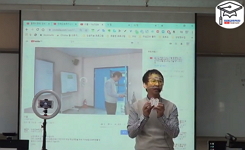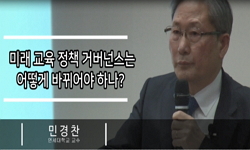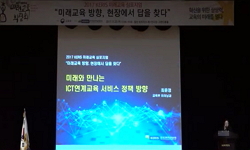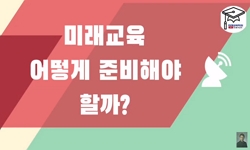This study focuses on process drama for the revitalization of theater education in South Korea, and suggests its application to classes in secondary schools focusing on its educational effects. With the advent of the special situation of COVID-19 alon...
http://chineseinput.net/에서 pinyin(병음)방식으로 중국어를 변환할 수 있습니다.
변환된 중국어를 복사하여 사용하시면 됩니다.
- 中文 을 입력하시려면 zhongwen을 입력하시고 space를누르시면됩니다.
- 北京 을 입력하시려면 beijing을 입력하시고 space를 누르시면 됩니다.
https://www.riss.kr/link?id=T15926907
- 저자
-
발행사항
안양 : 성결대학교 교육대학원, 2021
-
학위논문사항
학위논문(석사) -- 성결대학교 교육대학원 교육학과 , 연극영화교육전공 , 2021. 8
-
발행연도
2021
-
작성언어
한국어
- 주제어
-
발행국(도시)
경기도
-
형태사항
92 p. 26cm
-
일반주기명
성결대학교 논문은 저작권에 의해 보호받습니다.
지도교수:이원현
참고문헌 수록: p.83-92 -
UCI식별코드
I804:41025-200000500290
- 소장기관
-
0
상세조회 -
0
다운로드
부가정보
다국어 초록 (Multilingual Abstract)
This study focuses on process drama for the revitalization of theater education in South Korea, and suggests its application to classes in secondary schools focusing on its educational effects.
With the advent of the special situation of COVID-19 along with the 4th Industrial Revolution, the present era requires a change in the method of education. Moving with the change to the competency-based curriculum that takes place under such circumstances, the Ministry of Education paid attention to ‘theatre’ as a subject that can develop six core competencies in order to nurture ‘creative and convergent talent’, a future-oriented human resource.
For school teachers, however, theater class is limited to Korean language lessons in the elementary and middle school curriculum, and is implemented as general electives in the high school curriculum. This means that theater education is still considered unfamiliar in schools. At the same time, it creates an environment in which it is difficult to continuously discuss the theater education method linked to schools.
By recognizing these problems and analyzing them from various perspectives, the author of this study discovered the utility of process drama as a method of theater education in the larger context of school culture and arts.
Especially, this study understands the need to expand the research on process drama, which is currently focused on young children and elementary school students, to secondary school students. Furthermore, it intends to focus in discussion on the educational effectiveness that can be achieved when using process drama in secondary school drama classes.
In conclusion, this study emphasizes that education should be continuously developed and prepared for the future even in the present difficult time. It argues that breaking from the past education method which involved Korean youths simply memorizing printed knowledge and raising test scores, we should use the process drama related to convergent education to gain a deep insight into life and strive to solve the complex problems facing society.
This is based on the belief that the use of process drama is useful for revitalizing theater education in the future, as shown through the blueprint for nurturing creative and convergent talent suggested through the previous revision curriculum and major changes such as the creation of a theater curriculum that leans on it.
The implications of this study can be summarized as follows.
First, if process drama is used in a class for secondary school students, it makes it possible to have an in-depth understanding of the life of adolescence as it is a method suitable for the trend which emphasizes integrated (convergent) art education that characteristically works with future growth.
Second, process drama covers from current problems to future problems and can promote creative problem-solving of secondary school students, through the essential structures of esthetic engagement, critical detachment, and various characteristics used during activities.
In order to derive these results, this study studies the characteristics of process drama in literature and presents a case study of process drama for revitalization of domestic theater education. It is hoped that the educational effects that can be obtained through the course drama will be confirmed with this, and that various discussions will be conducted for the revitalization of theater as a school subject in the follow-up studies in the future.
국문 초록 (Abstract)
본 연구는 국내연극교육의 활성화를 위하여 과정드라마(Process Drama)에 주목하여 그 교육적 효과를 중심으로 중등학교 대상 수업 적용을 제언하는 연구이다. 현시대는 4차 산업혁명 시대와 함...
본 연구는 국내연극교육의 활성화를 위하여 과정드라마(Process Drama)에 주목하여 그 교육적 효과를 중심으로 중등학교 대상 수업 적용을 제언하는 연구이다.
현시대는 4차 산업혁명 시대와 함께 ‘코로나19’ 라는 특수한 상황이 도래함으로써 교육의 방식도 변화가 요구된다. 이러한 역량중심 교육과정으로의 변화 흐름 속에서 교육부는 미래 지향적 인재상인 ‘창의·융합형 인재’를 양성하기 위하여 6가지 핵심역량을 기를 수 있는 과목으로 ‘연극’에 주목하였다.
그러나 실제 현장에서 연극 수업은 초, 중등학교 교육과정에 국어 단원으로 한정되고 고등학교 교육과정엔 일반선택으로 시행되는 정도이다. 이는 연극 교육이 교육 현장에서 여전히 생소하게 여겨진다는 것이며, 동시에 현장과 연계된 연극 교육방법에 대한 논의가 지속적으로 이루어지기 어려운 환경을 만들고 있다.
본 연구자는 이러한 문제점을 인식함과 동시에 다각도의 분석을 통하여 현시대의 학교문화예술의 큰 흐름에서 연극 교육 방법으로 과정드라마(Process Drama)가 지닌 효용성을 발견하였다.
특히 본 연구에서는 현재 유아나 초등 대상에 집중되어있는 과정드라마에 대한 연구가 중등학교 대상으로의 확대가 필요함을 인식하며, 중등학교 연극 수업에서 과정드라마 활용시 이루어질 수 있는 교육적 효과성에 대해 집중 논하고자 한다.
결론적으로 본 연구는 현재의 어려운 시기에서도 교육은 지속, 발전되어야 하며 미래를 대비하여야 함을 역설하고 있다. 우리의 청소년들이 단순히 활자화된 지식을 암기하고 시험점수를 높여야 했던 과거의 교육방식이 아닌, 융합교육과 연관된 과정드라마를 활용하여 삶에 대해 깊이 있게 통찰하며, 사회에서 당면한 복잡한 문제들을 해결하기 위해 노력해야 함을 주장한다.
이는 앞선 개정 교육과정들을 통해 주장된 창의·융합형 인재 양성에 대한 청사진과 여기에 기대어선 연극교과의 신설과 같은 주요한 변화들을 통해, 과정드라마의 활용이 미래 연극 교육 활성화를 위해 효용성이 있다는 믿음에서 나타난다.
본 연구의 시사점을 크게 요약하면 다음과 같다.
첫째, 중등학교 학생들을 대상으로 한 수업에서 과정드라마가 활용된다면 그 특성적으로 미래 성장과 함께하는 통합(융합)예술교육이 강조되는 흐름에 알맞은 방법으로써 중요한 청소년기의 삶에 대한 깊이 있는 이해를 가능하게 한다.
둘째, 과정드라마는 본질적 구조인 몰입과 비판적 거리두기, 활동 중에 사용되는 다양한 특성들을 통하여 당면한 문제부터 미래의 문제까지 아우르며 중등학교 학생들의 창의적인 문제 해결을 도모할 수 있다.
본 연구는 이러한 결과를 도출하기 위하여 과정드라마의 특성을 문헌연구하고 국내연극교육의 활성화를 위한 과정드라마 수업사례를 제시한다. 이를 통해 과정드라마를 통하여 얻을 수 있는 교육적 효과를 확인하고, 앞으로 진행되는 후속 연구에서도 연극교과의 활성화를 위한 다양한 논의들이 진행되었으면 한다.
목차 (Table of Contents)
- 제1장 서론 1
- 제1절 연구의 필요성 및 목적 1
- 제2절 연구의 범위 및 방법 6
- 제2장 현시대 학교예술교육의 흐름 7
- 제1장 서론 1
- 제1절 연구의 필요성 및 목적 1
- 제2절 연구의 범위 및 방법 6
- 제2장 현시대 학교예술교육의 흐름 7
- 제1절 생활과 과정 중심 드라마 7
- 제2절 통합예술교육으로의 전환 16
- 제3절 직접 경험으로서의 예술을 통한 삶의 성장 22
- 제3장 연극교과에서의 과정드라마 28
- 제1절 과정드라마의 개념과 목표 28
- 제2절 과정드라마의 작동 원리 34
- 1. 감정적 몰입을 위한 장치 35
- 2. 비판적 거리두기를 위한 장치 37
- 제3절 과정드라마의 특징 41
- 제4장 연극교과에서의 과정드라마 활용 44
- 제1절 ‘지금, 여기’ 공유에 의한 삶의 이해와 성찰 45
- 1. 극적 살아보기를 통한 자아와 마주하기 45
- 2. 극적 몰입을 통한 재구성된 의미 생성 51
- 제2절 극적 재현과 경험에 의한 창의적 문제해결 60
- 1. 감정 이입과 거리두기를 통한 딜레마 체험 64
- 2. 역할입기를 통한 다양한 관점의 이해 70
- 3. 극적 변형을 통한 새로운 가능성의 확장 76
- 제5장 결론 81
- 참고문헌 83
- ABSTRACT 90












